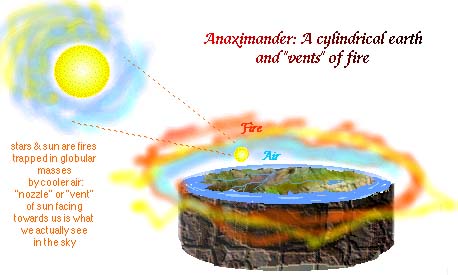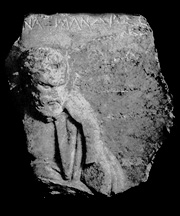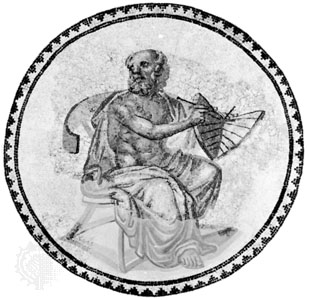Allgemein
Anaximander
b. 610 BC, Miletus [now in Turkey]
d. 546/545 BC
Greek philosopher often called the founder of astronomy, the
first thinker to develop a cosmology, or systematic
philosophical view of the world.
Anaximander
is thought to have been a pupil of Thales of Miletus. Evidence
exists that he wrote treatises on geography, astronomy, and
cosmology that survived for several centuries, and that he
made a map of the known world. As a rationalist he prized
symmetry and introduced geometry and mathematical proportions
into his efforts to map the heavens. Thus, his theories
departed from earlier, more mystical conceptions of the
universe and prefigured the achievements of later astronomers.
http://www.britannica.com/bcom/eb/article/1/0,5716,7481+1+7394,00.html

Anaximander
John Burnet
Anaximander,
son of Praxiades, was also a citizen of Miletus, and Theophrastus
described him as an "associate" of Thales.
Like his predecessor, he distinguished himself by certain
practical inventions. Some writers credited him with that of
the gnomon; but that can hardly be correct. Herodotus
tells us this instrument came from Babylon, and Thales
must have used it to determine the solstices and equinoxes. Anaximander
was also the first to construct a map, and Eratosthenes said
this was the map elaborated by Hecataeus. No doubt it was
intended to be of service to Milesian enterprise in the Black
Sea. Anaximander
himself conducted a colony to Apollonia, and his
fellow-citizens erected a statue to him.
http://plato.evansville.edu/public/burnet/ch1b.htm
Anaximander
Gerne werden die
Ansichten des griechischen Philosophs Anaximander (6. Jh. v.
Chr.) als früheste uns bekannte allumfassende Theorie, die
auf personifizierte Gottheiten verzichtet, dem Mythos gegenübergestellt.
Betrachtet man jedoch Anaximanders Vorgehensweise bei der
Aufstellung seines Weltbilds, so hat dies meiner Meinung nach
viel mehr mit Mythologie denn mit Wissenschaft zu tun.
http://www.tillmann-group.de/mythen/anaximander.htm
Anaximander of Miletus (610-ca. 546 BC)
Eric W. Weisstein
Greek philosopher who was a pupil of Thales.
Like Thales,
Anaximander also imported ideas from the East, including the
sundial. Anaximander conceived the idea that the stars
were fixed on a crystalline sphere rotating around the Earth.
http://www.treasure-troves.com/bios/Anaximander.html
Anaximander
(611-547 BCE.)
Anaximander was a Greek philosopher of Miletus, born 611 BCE.,
and hence a younger contemporary of Thales and Pherecydes. He
lived at the court of Polycrates of Samos, and died 547. He
wrote a prose work in the Ionic dialect of which on fragment
survives. Anaximander thought it unnecessary to fix upon air,
water, or fire as the original and primary form of body. He
preferred to represent it simply as a boundless something from
which all things arise and to which they all return again.
http://www.utm.edu/research/iep/a/anaximan.htm
Anaximander
- Fragments and Commentary
Arthur Fairbanks
Anaximandros of Miletos was a companion or pupil of Thales.
According to Apollodoros he was born in the second or third
year of the forty-second Olympiad (611-610B.C.). Of his life
little is known; Zeller infers from the statement of Aelian
(V.H. iii. 17) to the effect that he led the Milesian colony
into Apollonia, that he was a man of influence in Miletos. He
was a student of geography and astronomy; and various
inventions, such as the sundial, are attributed to him. His
book, which was referred to as the first philosophical
treatise in Greece, may not have received the title "GREEK"
until after his death. It soon became rare, and Simplicius
does not seem to have had access to it.
http://history.hanover.edu/texts/presoc/anaximan.htm
Anaximander
of Miletus
(c. 6th century B.C.)
Anaximander said that the principle and element of existing
things was the infinite. And the source of coming-to-be
for existing things is that into which destruction, too,
happens 'according to necessity; for they pay penalty
and retribution to each other for their injustice according to
the assessment of Time' as he describes it in these rather
poetical terms. - Simplicius Phy. 24,13
http://www.mit.edu:8001/afs/athena.mit.edu/user/g/w/gwj/www/html_dox/Anaximander.html
Anaximander
c.611–c.547 B.C., Greek philosopher, b. Miletus; pupil of Thales.
He made the first attempt to offer a detailed explanation of
all aspects of nature. Anaximander argued that since there are
so many different sorts of things, they must all have
originated from something less differentiated than water, and
this primary source, the boundless or the indefinite (apeiron),
had always existed, filled all space, and, by its constant
motion, separated opposites out from itself, e.g., hot and
cold, moist and dry.
http://www.bartleby.com/65/an/Anaximan.html
|




